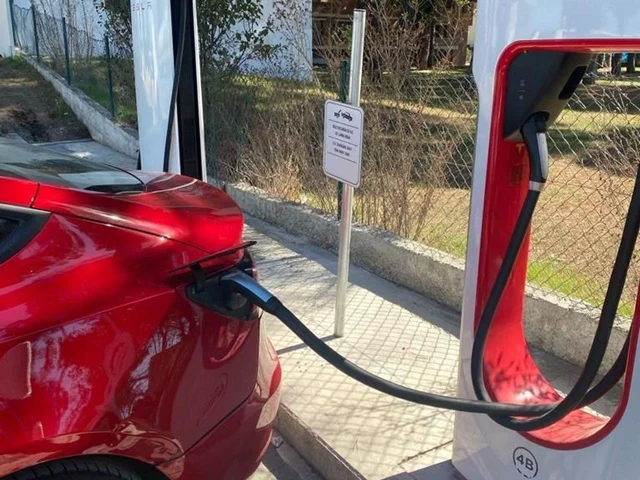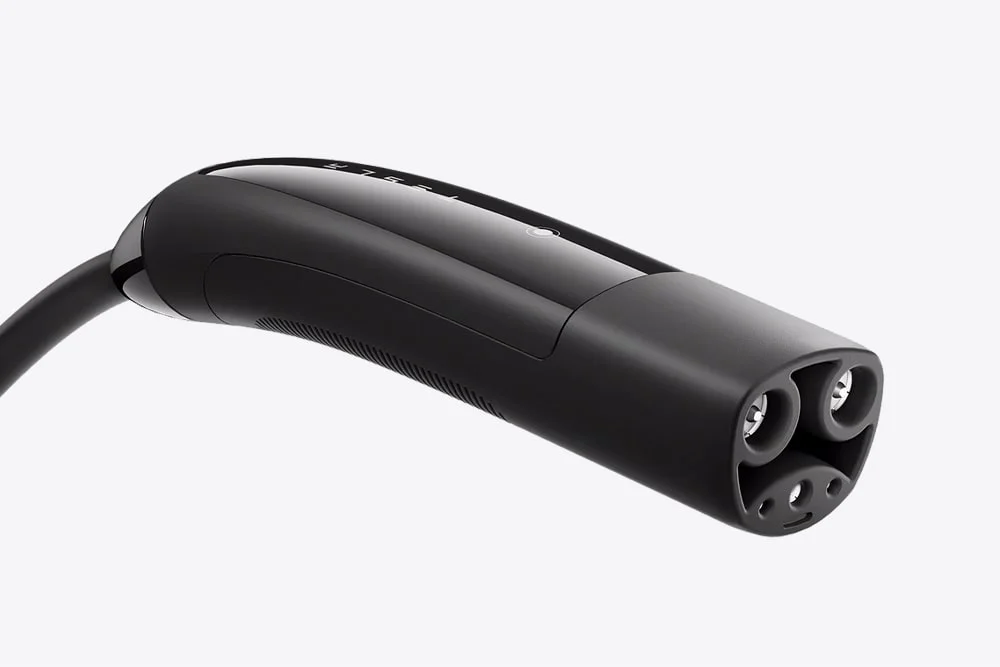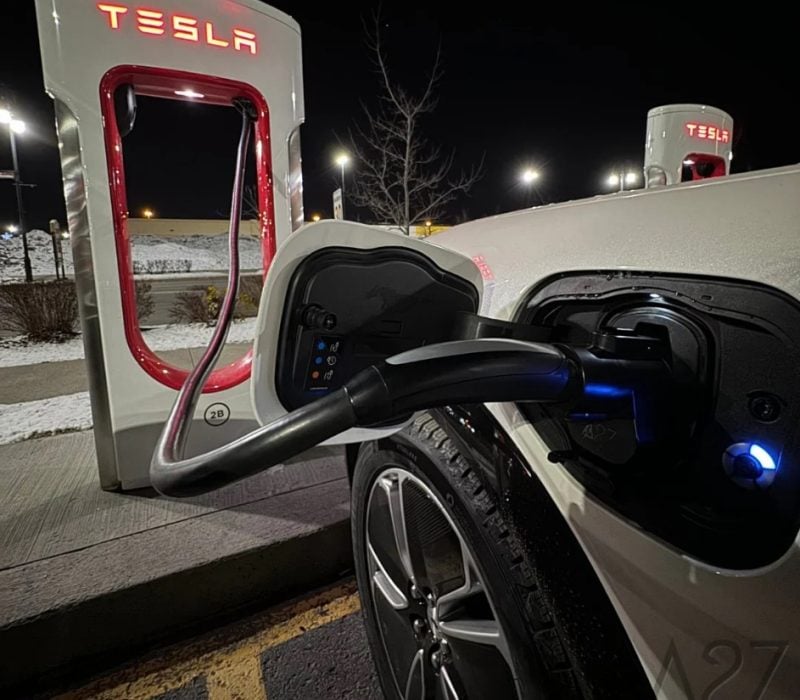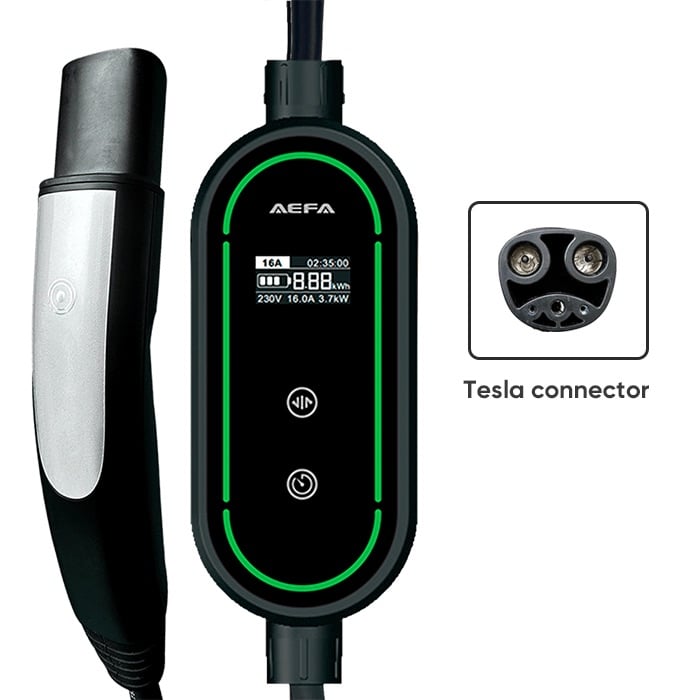Not sure about choosing a charger? Try our revamped Charger Finder!
Try our revamped Charger Finder!
- For Installations
- All our chargers come with a 1 year warranty
- Free Shipping
June 19, 2024
In the U.S., the charging connector standard for all non-Tesla vehicles up until 2024 has been the type 1 connector also known as the J1772 type 1 connector. This describes the electrical and mechanical form factor of the charger end that connects into the EV’s charging port.
The electric vehicle (EV) market is gradually evolving toward greater inclusivity, starting with standardizing charging protocols. Traditionally, most EVs in North America have utilized the J1772 plug for charging—except for Tesla, which employs its proprietary Supercharger connector. Tesla’s Supercharger network, renowned for its extensive coverage, reliability, and user-friendly interface, was the first to span the country, setting a high benchmark and becoming a coveted feature among other EV owners.
The NACS connector is the name given to the charging port/connector type for both residential chargers such as the Tesla Wall Connector and commercial Supercharger charging stations. Given the large presence of Tesla charging stations with the NACS connector, many electric vehicle manufacturers are moving over to the NACS standard. This will allow EV owners to be more confident of fast, nearby charging station.

Tesla’s plan is to set the stage for its Supercharger network to become the new EV charging standard in North America by releasing its design to third-party manufacturers in 2022. Prior to this, Tesla tested non-Tesla EV charging in select European cities.
Tesla’s role in the drive towards a universal (NACS) connector type
Tesla has licensed its proprietary NACS connector to other EV car manufacturers. The NACS connector is a better technology with unique cooling features which enable the cable to be thinner, making it lighter and much more maneuverable compared to J1772 / CCS 1 connector types. The move means consumers will have more choice and a wider network of fast superchargers to charge at. The benefit for Tesla is more revenue at its charging stations, more visibility of the Tesla brand name and recognition for the Tesla brand.
Tesla’s plan is to set the stage for its Supercharger network to become the new EV charging standard in North America by releasing its design to third-party manufacturers in 2022. Prior to this, Tesla tested non-Tesla EV charging in select European cities.
Tesla’s role in the drive towards a universal (NACS) connector type
Tesla has licensed its proprietary NACS connector to other EV car manufacturers. The NACS connector is a better technology with unique cooling features which enable the cable to be thinner, making it lighter and much more maneuverable compared to J1772 / CCS 1 connector types. The move means consumers will have more choice and a wider network of fast superchargers to charge at. The benefit for Tesla is more revenue at its charging stations, more visibility of the Tesla brand name and recognition for the Tesla brand.
In mid-2023, major automakers Ford and GM declared their support for the Supercharger, even before its standardization by SAE International. Since 2024, other automakers such as Stellaris, which includes Chrysler, Jeep, Dodge, Ram, Fiat, Maserati, and Alfa Romeo, will launch models with NACS charging ports.
What is NCAS and what does it stand for?
The North American Charging Standard (NACS), also known as the Tesla charging standard or Tesla Supercharger network, is a charging connector system developed by Tesla Motors. It enhances existing Tesla chargers with a new protocol designed to improve compatibility and interoperability among various EVs.
Unlike the previous connectors that utilized CAN bus communication, NACS employs power-line communication (PLC) that makes it more universal. Additionally, NACS adheres to the ISO 15118 protocol, which is also used by Combined Charging System (CCS) connectors. This allows NACS to work with any CCS-enabled EV, enabling different vehicle brands to use the same charging stations seamlessly.
What is the timing for EV manufacturers to switch to NACS?
Ford was the first major automaker to collaborate with Tesla and announce its adoption of the NACS plug. This move set off a wave of other agreements, as other big automakers scrambled to committing to integrate the NACS charge port into their EV models in the coming years. This was to maintain competitiveness.
Today, the list of automakers embracing Tesla’s NACS charge port includes industry giants such as BMW, General Motors, Honda, Hyundai, Jaguar, Kia, Lexus, Mercedes-Benz, Mini, Nissan, Volvo, Rivian, Rolls-Royce, Subaru, Toyota, and more. Many automakers will even offer in-car apps with integration for paying for charging and pre-programmed navigation features to direct drivers to the nearest charging ports.
What is the timing for EV manufacturers to switch to NACS?
Ford was the first major automaker to collaborate with Tesla and announce its adoption of the NACS plug. This move set off a wave of other agreements, as other big automakers scrambled to committing to integrate the NACS charge port into their EV models in the coming years. This was to maintain competitiveness.
Today, the list of automakers embracing Tesla’s NACS charge port includes industry giants such as BMW,

General Motors, Honda, Hyundai, Jaguar, Kia, Lexus, Mercedes-Benz, Mini, Nissan, Volvo, Rivian, Rolls-Royce, Subaru, Toyota, and more. Many automakers will even offer in-car apps with integration for paying for charging and pre-programmed navigation features to direct drivers to the nearest charging ports.
| Automaker | Date |
| BMW | Early 2025 |
| Fisker | 2025 |
| Ford | Spring 2024 |
| Genesis | Late 2024 |
| General Motors | 2024 |
| Honda | 2025 |
| Hyundai | Late 2024 |
| Jaguar | 2025 |
| Kia | Late 2024 |
| Lexus | 2025 |
| Automaker | Date |
| Lucid | 2025 |
| Mercedes-Benz | 2025 |
| Mini | Early 2025 |
| Nissan | 2025 |
| Polestar/Volvo | 2025 |
| Rivian | 2025 |
| Rolls-Royce | Early 2025 |
| Subaru | 2025 |
| Toyota | 2025 |
Which electric vehicles currently use NACS?
Earlier this year, Tesla officially opened its Supercharging network to non-Tesla EVs by introducing the “Superchargers Open to NACS”. This was launched as a filter on the Tesla app. Ford was the first automaker to take advantage of this, releasing its NACS adapter. In March, Ford began a waitlist for a complimentary adapter for its customers, with the first batch shipped weeks later. Rivian followed suit with its own adapter. However, both automakers faced an overwhelming number of registrants, resulting in shipping delays.
Are NACS adapters available so I can charge my CCS 1 / J1772 car at a Tesla Supercharger?
Yes, there are a range of adapters available. This allows EV owners with a CCS 1 charging port to charge at a Tesla charging station. We are surprised that we don’t see more inquiries for these adapters but expect as consumers become more familiar with Tesla charging stations, that the purchase of adapters will increase.
Which electric vehicles currently use NACS?
Earlier this year, Tesla officially opened its Supercharging network to non-Tesla EVs by introducing the “Superchargers Open to NACS”. This was launched as a filter on the Tesla app. Ford was the first automaker to take advantage of this, releasing its NACS adapter. In March, Ford began a waitlist for a complimentary adapter for its customers, with the first batch shipped weeks later. Rivian followed suit with its own adapter. However, both automakers faced an overwhelming number of registrants, resulting in shipping delays.

Are NACS adapters available so I can charge my CCS 1 / J1772 car at a Tesla Supercharger?
Yes, there are a range of adapters available. This allows EV owners with a CCS 1 charging port to charge at a Tesla charging station. We are surprised that we don’t see more inquiries for these adapters but expect as consumers become more familiar with Tesla charging stations, that the purchase of adapters will increase.
What are the benefits of NACS adoption?
NACS will bring many benefits to the electification of auto vehicles. The benefits include reducing range anxiety since there will be many more charging options. Tesla has a reported 70,000+ EV charging stations with many located in ideal charging locations. The NACS North American charging standard will also, over time, reduce confusion by having one common charging standard. Overall, the EV charging ecosystem will bend toward NACS and the major companies such as Electify America have announced plans to provide NACS adapters for their CCS1 charger points.
What EV owners need to know?
If you are buying a new EV during this period, you are entering the market at a transitional time. Currently, most non-Tesla EVs come equipped with CCS ports, but as North America shifts towards the NACS connector, the availability of CCS charging ports might gradually decrease. It will take at least two years before all non-Tesla EV manufacturers start incorporating NACS connectors into their vehicles. This means that if you buy a non-Tesla EV now, you might eventually need to use an adapter to charge at stations with NACS connectors.
For Tesla owners, the shift to NACS will likely simplify things. As more charging networks adopt NACS, Tesla drivers will have access to a wider range of charging locations across the country, enhancing convenience and travel flexibility.
If you own or plan to buy a non-Tesla EV with a CCS port, your experience will remain largely unchanged in the near term. Third-party charging networks will continue to support CCS connectors, though they may gradually introduce NACS connectors over time. Initially, some charging stations will offer NACS connectors while others will retain CCS connectors. As the transition progresses, having an adapter will be useful for charging at NACS-equipped stations. Some stations may provide these adapters, but in other cases, you will need your own.
For those considering buying a new EV, it might be worth waiting a bit longer until the transition to NACS is complete, especially if you prefer a non-Tesla brand. Alternatively, purchasing a Tesla ensures that you will have a vehicle with what appears to be the emerging standard connector in the U.S. However, even if you buy a non-Tesla EV now, it will likely be several years before it becomes challenging to find charging stations with CCS connectors. Using an adapter will likely become a manageable solution for most EV owners.
For many buyers, using an adapter to charge occasionally will not be a significant issue, particularly for those who primarily charge at home. Home charging setups can be equipped with CCS chargers or adapters, ensuring a seamless charging experience. Thus, while the transition may cause some initial uncertainty, the long-term benefits of a unified charging standard are likely to outweigh the temporary inconveniences.

The best NACS EV charger for your home?
AEFA has been producing residential EV Chargers for the last 5 years. Our EV chargers are built to the highest standards with high quality material, built in breakers offering safety protection, ground protection, extra length cable to avoid stretching and a range of EV charging accessories. Sturdy, simple to use and with a large oval charging light, the AEFA NACS EV charger is 4.4 star reviewed EV charger.
The AEFA NACS EV Charger is available in the most popular level 2 plug configurations such as the NEMA 14-50 and NEMA 6-50 plug types.
The AEFA Level 2 NACS EV Charger is compatible with all Tesla vehicles and future NACS adapters such as Ford, Kia and Toyota whose models from 2025 will be NACS compatible. The AEFA NACS EV charger delivers the convenience of Level 2 charging speeds without requiring a fixed, wall-mounted unit. It can be wall mounted like a traditional EV charger but also can be easily unplugged and used as a portable charger. By plugging directly into a 240V outlet, it provides up to 9.6 kW / 40 Amp output, translating to approximately 32-36 miles of range per hour. Its key advantage is portability, enabling use nearly anywhere with a NEMA 14-50 outlet or 6-50 outlet, making it a versatile and flexible charging solution for Tesla owners.
The AEFA NACS EV Charger is available in the most popular level 2 plug configurations such as the NEMA 14-50 and NEMA 6-50 plug types.
The AEFA Level 2 NACS EV Charger is compatible with all Tesla vehicles and future NACS adapters such as Ford, Kia and Toyota whose models from 2025 will be NACS compatible. The AEFA NACS EV charger delivers the convenience of Level 2 charging speeds without requiring a fixed, wall-mounted unit. It can be wall mounted like a traditional EV charger but also can be easily unplugged and used as a portable charger. By plugging directly into a 240V outlet, it provides up to 9.6 kW / 40 Amp output, translating to approximately 32-36 miles of range per hour. Its key advantage is portability, enabling use nearly anywhere with a NEMA 14-50 outlet or 6-50 outlet, making it a versatile and flexible charging solution for Tesla owners.
Alex Gillespie | June 2024
Lorem ipsum dolor sit amet, consectetur adipiscing elit. Ut elit tellus, luctus nec ullamcorper mattis, pulvinar dapibus leo.